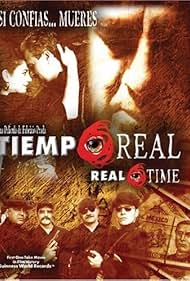- Awards
- 2 wins & 2 nominations
Photos
- Director
- Writers
- All cast & crew
- Production, box office & more at IMDbPro
Storyline
Did you know
- TriviaHolds the official Guinness World Record for being the "First One-Take Movie in Film History".
- Crazy creditsThe movie is dedicated to Al Lewis, "Grampa Munster".
Featured review
On the other hand, this is truly the most challenging formal experiment carried out in recent years, at least as far as what commercially distributed Mexican cinema is concerned. It's considered, according to the Guiness' Book of Records, the first the one-take full-length, narrative film ever. There are Mexican filmmakers who enjoy more credit than Prada, such as frequent collaborators Alejandro González Iñárritu and screenwriter Guillermo Arriaga. They apply narrative models as old as parallel storytelling, their most characteristic technique. It dates as far back as D.W. Griffith's "Birth of a Nation" and "Intolerance," and they use it much in the same fashion. It also has been recently resorted to in American blockbusters such as "Pulp Fiction," and the Mexican "Midaq Alley", which are previous to their work. Their stories usually revolve around a circumstance, regardless of the sort, that links the fates of otherwise distant characters. Iñarritu/Arriaga's movies are also at a constant risk of falling into the same biased point of view which Griffith was known to have. Their characters and stories strongly depend on preconceptions of what a place and its inhabitants are. Their stories, according to what commercial models prescribe, strongly depend on villains, victims and heroes. Thus, given their "realistic" approach to film-making, the peoples and places they represent are necessarily going to be outlined and displayed in a partial focus. In their movies, foreigners from developed countries or higher social classes seem to be favored with the roles of heroes and victims. Meanwhile, people from third-world countries, especially México, are always portrayed as unscrupulous villains. On one hand, it's ironic that they represent people from their own country in such a degrading way. On the other, their movies, as most that compete in international festivals representing México, usually take place in this country's Federal District, where the political and corporative powers concentrate, showcasing only the local customs and talent. Worst of all, Iñárritu has followed the same narrative approach in all of his movies. This and his recurring themes suggest that his so-called "style" is nothing more than a formula.
Let it be said as a parentheses that it's strange how the Mexican media used to refer to "Amores Perros" (Love's a Bitch, 2000) as Iñárritu's first full-length movie. By then he had already made "Detrás Del Dinero" (After the Money, 1996), a TV film that runs close to sixty minutes. This duration would almost fit it in the category of a feature-film. It's not even listed on film databases at all, even though it was made for Televisa, one of the most powerful telecommunications companies in México. When "Amores Perros" was first released, audiences thought that Iñárritu was a groundbreaking, "independent" first-time filmmaker, when he was not, since he had worked previously for the established industry. He used the same parallel storytelling on this "obscure" film as with the rest of his movies.
This is not to say that "Real Time" doesn't suffer from some of the most common clichés in Mexican cinema. For instance, the overuse of foul Mexican slang and its guitar-driven score are all too similar to the way Iñárritu applies them in what's arguably considered his feature length debut. Maybe Prada intentionally incorporated such elements, given the success at the box offices of "Amores Perros", to appeal to the same audiences. Nevertheless, as opposed to "Amores Perros", his story takes place outside of México City. Maybe given the minuscule budget of his film, he uses local, non good-looking professional actors. We don't get to see the familiar, pretty faces from the established industry, who usually base their work activity in México City also. He also breaks with the recent tendency in this country to use non-professional actors, used with shameful results in such films as "Batalla en el Cielo" (Battle in Heaven, 2005, Cannes official selection for Mexico last year, believe it or not). But most of all, "Real Time" benefits from a story which illuminates the human condition rather than making biased judgments on reality, especially within a certain context. In other words, "Real Time" could well be remade anywhere without having to make references to specific time, space, ethnicity, language, race or compromising consistency.
There's no other movie in Mexican cinema which, at the script level, plays so much with what audiences expect from the characters. At the technical level, neither there is another film that achieves so much control over the development of the story without having to resort to editing, a fundamental element of cinema's language. Prada achieves this through carefully staging the elements on the scene and the camera movements, which took him more than a few long and exhaustive rehearsals. Not only he masterfully narrates a story but in the making of this film (and the film itself) he also gives us a valuable lesson on the worthlessness of money.
Let it be said as a parentheses that it's strange how the Mexican media used to refer to "Amores Perros" (Love's a Bitch, 2000) as Iñárritu's first full-length movie. By then he had already made "Detrás Del Dinero" (After the Money, 1996), a TV film that runs close to sixty minutes. This duration would almost fit it in the category of a feature-film. It's not even listed on film databases at all, even though it was made for Televisa, one of the most powerful telecommunications companies in México. When "Amores Perros" was first released, audiences thought that Iñárritu was a groundbreaking, "independent" first-time filmmaker, when he was not, since he had worked previously for the established industry. He used the same parallel storytelling on this "obscure" film as with the rest of his movies.
This is not to say that "Real Time" doesn't suffer from some of the most common clichés in Mexican cinema. For instance, the overuse of foul Mexican slang and its guitar-driven score are all too similar to the way Iñárritu applies them in what's arguably considered his feature length debut. Maybe Prada intentionally incorporated such elements, given the success at the box offices of "Amores Perros", to appeal to the same audiences. Nevertheless, as opposed to "Amores Perros", his story takes place outside of México City. Maybe given the minuscule budget of his film, he uses local, non good-looking professional actors. We don't get to see the familiar, pretty faces from the established industry, who usually base their work activity in México City also. He also breaks with the recent tendency in this country to use non-professional actors, used with shameful results in such films as "Batalla en el Cielo" (Battle in Heaven, 2005, Cannes official selection for Mexico last year, believe it or not). But most of all, "Real Time" benefits from a story which illuminates the human condition rather than making biased judgments on reality, especially within a certain context. In other words, "Real Time" could well be remade anywhere without having to make references to specific time, space, ethnicity, language, race or compromising consistency.
There's no other movie in Mexican cinema which, at the script level, plays so much with what audiences expect from the characters. At the technical level, neither there is another film that achieves so much control over the development of the story without having to resort to editing, a fundamental element of cinema's language. Prada achieves this through carefully staging the elements on the scene and the camera movements, which took him more than a few long and exhaustive rehearsals. Not only he masterfully narrates a story but in the making of this film (and the film itself) he also gives us a valuable lesson on the worthlessness of money.
Details
- Release date
- Country of origin
- Official site
- Language
- Also known as
- A Day in Paradise
- Filming locations
- Production companies
- See more company credits at IMDbPro
- Runtime1 hour 30 minutes
- Color
- Sound mix
Contribute to this page
Suggest an edit or add missing content



